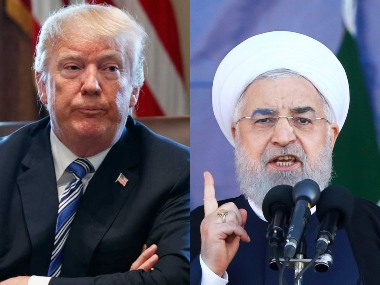The United States of America
declared war on Iran this week and then pulled back , possible in the modern era when machines can be told to return mid-flight. President Donald Trump wanted to retaliate as Iran had shot down a
US military drone that was near its border, but said he had called off the attack after being told that 150 Iranis would die in the strike. Trump has been
itching for a war with Iran, as have been some of the more deranged members of his administration in the US, such as National Security Adviser John Bolton. The
price of oil shot up by 10 percent this week because of America’s belligerence, bringing suffering to India and nations like it that are dependent on oil imports. The question is, why does the US want to fight Iran? The answer is neither easy to locate nor to understand. [caption id=“attachment_6866311” align=“alignleft” width=“380”] File images of US president Donald Trump and Iran president Hassan Rouhani. AP photos[/caption] In civilisational terms, Iran is the oldest enemy of the West. Some 2,400 years ago, the Irani army, led first by Darius and then Xerxes, invaded Greece and destroyed Athens, according to the Greeks themselves. The Irani army included a large number of Indian mercenaries, described in the history written by Herodotus. Throughout ancient history, the Greeks referred to the Irani emperor as the Great King (‘megas’) because of his influence over their lives. The Macedonian conqueror of Egypt, Iran, Afghanistan and Punjab was called Alexander the Great not because of his military achievements but because he took the title of ‘Great’ from Darius III the Great. After the death of Alexander at the age of 33, his generals divided and ruled his empire. The largest part, from Punjab to Turkey, which included Iran, went to Seleucus Nikator (‘Nikator’ means victor and is the same term used by sports brand Nike). Iranis took back their country under the Parthian ruler Arsaces. All these people were Zoroastrian, meaning of the same faith, as our Indian Parsis. The Parthians fought against the second great western power of history, Rome, for three centuries. The next group of Irani conquerors were the Sasanians, who ruled Iran till the Arabs conquered it in the 7th Century. Iran became Shia under the Safavids around 400 years ago, though the most famous Shia ruler for Indians, Nadir Shah, who destroyed the Mughal empire, was Sunni. In the modern era, the US has actively
meddled in Irani politics . In 1953, Iran’s elected prime minister Mohammed Mossadegh was overthrown by a coup believed to have been orchestrated by the American Central Intelligence Agency because he nationalised the oil industry. America also actively fuelled the Iran-Iraq war, backing Iraqi leader Saddam Hussain, whom it would later sour on. In 1979, during Jimmy Carter’s presidency, Irani revolutionaries took over the American embassy in Tehran and held embassy staff hostage for weeks. It was following this that the US has not had formal relation with Iran. The Irani population in America is serviced through the Pakistan embassy. Iran was able to come to an agreement with the Obama administration on its
nuclear programme . There was hope that these two great nations would finally be friends. However, under the eccentric leadership of Trump, this hope has collapsed. Readers will know that Iran’s national religion is Shia Islam. Shiism is quietist by nature. Their belief is that the 12th Imam, Muhammad al Mahdi, who was born in 869 AD, is not dead. He has gone into occultation, which means he has been concealed by god and will return at some point. While they await his return, Shias will largely remain disengaged with the external world and concentrate on their own affairs conducted by their clergy. This is what I mean by quietist. It may interest readers to know that none of the Pakistani and Kashmiri groups that have been fighting India or its military have been Shia. The Jaish-e-Mohammed, Lashkar-e-Taiba, Hizbul Mujahideen, Harkatul Mujahideen, al Umar, al Qaeda, Islamic State, etc, are all Sunni groups. What is referred to as ‘jihadi terrorism’ has no component of Shiism. However, Iran has been a supporter of Palestinian groups, including Sunni groups, that have resisted Israel. This is the primary reason why the US is anti-Iran. Iranis have no conflict with the US, no border with the country, and there is no reason for America to hate it except for the fact that Israel insists that the US be tough on Iran because it speaks for the liberation of Palestine from occupation. India’s Shias are divided into further groups, but the largest one is the Twelver Shia. Their imams are in Iraq and Iran in cities like Qum and Karbala. India has a civilisational relationship with Iran. Arabs don’t understand Urdu, but their vocabulary is familiar to Iranis. Iran has remained a friend of India’s even under the anti-Muslim rule of the current dispensation. Globally, India is a believed to be a second-rate power, but we should do what we can to ensure that our two friends do not get into a confrontation that is meaningless and ultimately damaging to everyone, including us.
India should do what it can to ensure that our the US and Iran do not get into a confrontation that is meaningless and ultimately damaging to everyone, including the country.
Advertisement
End of Article
Written by Aakar Patel
Aakar Patel is a writer and columnist. He is a former newspaper editor, having worked with the Bhaskar Group and Mid Day Multimedia Ltd. see more


)

)
)
)
)
)
)
)
)



